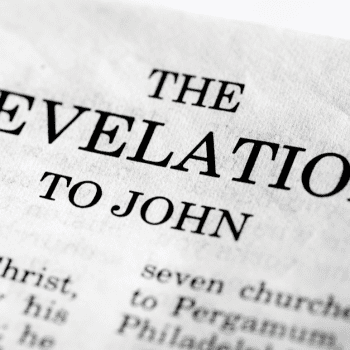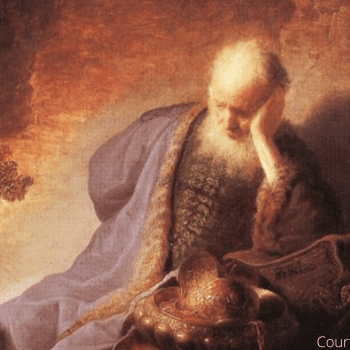 Monday: Read John 11:47-12:19
Monday: Read John 11:47-12:19
Having raised Lazarus from the dead, the authorities convene and determine that Jesus must die. In fact, Caiaphas, the high priest, declares that it would be best for one person to die for the sake of the nation (50). Of course, Caiaphas was thinking that if Jesus continued to gain followers eventually Rome would intervene. Thus, Jesus’ death would spare the nation from Rome’s oppression.
John notes the irony for us in case we missed it: “Now he [Caiaphas] did not say this on his own initiative, but being high priest that year, he prophesied that Jesus was going to die for the nation, and not for the nation only, but in order that He might also gather together into one the children of God who are scattered abroad” (51-52).
The Gospel of John makes it clear that the raising of Lazarus was the final straw that led to the determination to have Jesus put to death (53).
In order to understand Mary’s anointing of Jesus and the events that follow in John 13-17, it is critical to recall that Jesus is the temple presence of God (See Isa 6:4). Thus, Mary anoints Jesus “and the house was filled with the fragrance of the perfume” (12:3). This echoes the description of God’s glory filling the temple (see Exod 40:34-35; 1 Kgs 8:10-11).[2]
Jesus enters Jerusalem and is hailed as the King (12:13). Palm branches were a sign of national independence. The waving of them signifies the people’s readiness to receive Jesus as the king.
Jesus’ riding on a donkey fulfills Zech 9:9 and is a public proclamation that He is the king! The Gospel of John is bringing the story to its climactic moment!
Questions to ponder/discuss:
- Have you ever thought about the fact that maybe Lazarus didn’t want Jesus to raise him up? After all, if he had already passed into the presence of God (which we assume that he did??), perhaps he would have preferred to stay there. How do you think Lazarus’ life after being raised was different than his life prior to his (first) death?
- Do we need to have an after-life experience like Lazarus to be faithful to His call for our lives (it would be nice though!)? Or can we rely on His grace to be faithful without such an experience?
Tuesday: Read John 12:20-50
Some Greeks wish to see Jesus (21). These were likely Gentiles (i.e., those who were ethnically non-Jews: “gentiles” means “the nations”) that had come to follow the Jewish religion (God-fearers). The request to see Jesus sparks an interesting response from Jesus: “The hour has come for the Son of Man to be glorified” (23). Jesus seems to understand that the coming of the Greeks to see Him indicates “the hour has come” for Him to die. Note the cryptic riddle that follows (24-26). The essence of this riddle is that in order for Jesus to fulfill His mission to make God known to the world He must die (24).
This is a significant moment in the Gospel of John. Jesus came as the Word made flesh (1:1-3). As such, He is the temple presence of God made manifest (1:14). The mission of carrying forth the temple presence of God to the nations was not for Him but for His disciples and those after them (including us).
Jesus sees the coming of the Greeks as the indicator that the mission to Gentiles was ready to commence. Therefore, it was time for Him to depart (“the hour has come”) and for the Holy Spirit to come. It is the Holy Spirit who will empower the people of God to make Him known by taking the temple presence of God to the nations.
Questions to ponder/discuss:
- Jesus explains that by believing in Him we no longer remain in darkness (46). Instead, we have been given life unto the age (eternal life). This is the Gospel of John’s way of contrasting the Kingdom of God with the kingdoms of the world. His kingdom goes on forever. The irony is that to enter eternal life one must surrender their present life (25). How often do we try to gain eternal life and retain our present life? Of course, surrendering our life for the sake of eternal life is not easy. Even Jesus said, “Father, save Me from this hour” (27). Why do we struggle so much to surrender?
Wednesday: Read 13:1-38
John 13-17 is the center of the Gospel of John. Jesus must depart and the Holy Spirit must come. Jesus’ mission of making God known to the nations will be carried forth by the disciples and those after them (us). In order to accomplish this task, however, they must first be cleansed.
Jesus, as the temple of God, now prepares the disciples to become the place of God’s presence on the earth. Jesus will ascend to the Father, and the disciples are going to be the place of God’s presence moving forward. This cannot be overstated. The mission of Jesus is going to be carried forward by the disciples and those after them (us).
But in order to prepare them for this task, they must first be cleansed (5-20). The cleansing was a necessary task before one could enter the temple (see Exod 30:17-21). The washing of the disciples’ feet was much more than a symbol of humility. It was a sign of Jesus’ death and of their being prepared to serve as the place of God’s temple presence.
The opposition to the kingdom of God is present in John also. He notes that Satan enters Judas (27). Again, we are reminded that the conflict between the kingdom of God and the kingdoms of the nations is not an us (the people of God) versus them (the nations). Instead, it is waged by the devil against Christ.
The contrast between these kingdoms cannot be greater. Jesus’ kingdom is manifested by a sacrificial love to death for the sake of others. In doing so, we make Christ known: “A new commandment I give to you, that you love one another, even as I have loved you, that you also love one another. By this all men will know that you are My disciples, if you have love for one another” (John 13:34-35).
Questions to ponder/discuss:
- These climatic scenes in the Gospel of John remind us that love is the characteristic of Jesus’ kingdom. Love, of course, is the willingness to lay down one’s life for the other. If this causes us concern, John 14 reminds us that Jesus has granted the Holy Spirit so that we can fulfill this call.
- I recognize that some of you may have reached a point of: “Ok, I get it. Why can’t we move on to ‘how to be a better person?’” Our study of the Gospels (Matt-John) continues to stress the nature of the kingdom of God and the call to radical, self-giving love for the other. You might be used to devotional guides that talk about being kind, honest, and forgiving. It is interesting that we spend so much effort in Christianity talking about “how to be a better person,” and yet we are constantly confronted in the Gospels with, “how to be less that He might be more.” The question becomes: are we overstressing the call to die for the sake of the other? Or have we just been taught a Gospel of self-help all these years?
Thursday: Read John 14:1-31
John 14 is very commonly misunderstood. Many have read this passage as though Jesus was going away (to heaven) and that someday He will come back and bring us to heaven to be with Him forever. Instead, Jesus explains that He is going away in order that He might send them the Holy Spirit. That Jesus must leave so that the Holy Spirit will come is evident in Jesus’ words, “I will ask the Father, and He will give you another Helper” (16).
The dominant message of this passage is the continuing fellowship of Jesus through the Holy Spirit. This is good news for the disciples (and us). Jesus explains, that when He leaves, He “will not leave you as orphans; I will come to you” (18). The manner in which Jesus will come to us is by sending His Spirit.
The benefit of the Holy Spirit is that “He may be with you forever” (16). That is, while Jesus was with them often, the Holy Spirit will be with them/us constantly because “He abides with you and will be in you” (17). This is why the disciples did not need to be troubled by His leaving (1).
In addition, “the Helper, the Holy Spirit, whom the Father will send in My name, He will teach you all things, and bring to your remembrance all that I said to you” (26).
All of this means that when Jesus promises that there are many rooms/dwelling places (2), He is referring to the dwelling of God among His people in the person of the Holy Spirit and not some disembodied heavenly paradise. This is why Jesus says, “We [He and the Father] will come to him and make Our abode with him” (23). Note: The word of “abode” here (23) is the same word as “rooms/dwelling places” (2). The “rooms/dwelling places” (2) that Jesus has been talking about is fulfilled in the coming of the Holy Spirit to indwell the people of God.
Questions to ponder/discuss:
- John 14 is not about the going of Jesus and His future return, but about his sending the Spirit as the source of comfort to the disciples. The Spirit is with us always. The Spirit comforts us. The Spirit teaches us. The Spirit empowers us.
- When Jesus says, “Whatever you ask in My name, that will I do, so that the Father may be glorified in the Son. If you ask Me anything in My name, I will do it,” He does so in the context of the disciples (and our) continuing ministry after His death. If we need anything to accomplish the work that He has called us to (that of being the temple presence of God and making Him known to the nations), all we must do is ask and He will give it! So, what is holding you back from asking?
Friday: Read John 15:1-27
John 15-16 continue the Farewell Discourse (Jesus’ final speech to His disciples: chs 14-17) by amplifying Jesus’ words in 14:1-31.
Jesus begins by stating, “I am the true vine” (1) and the “Father is the vinedresser” (“farmer” 1). The vine was a common symbol for the people of Israel.[3] Thus Jesus declares that He is the embodiment of Israel. This means that for us to be considered part of God’s vineyard we must remain in Him!
Note: “abide” (or “remain” depending on your translation) occurs 10x (the number for the law) in 15:3-10. Thus, the law for God’s people is to remain in Christ.
What does this look like? It is manifested in love—“This is My commandment, that you love one another, just as I have loved you” (12). Again, we are reminded of what this love looks like: “Greater love has no one than this, that one lay down his life for his friends” (13).
Peter Walker summarizes John 15 well, “The crux of John 15 is that Jesus is changing the place of rootedness for Israel. The common prophetic metaphor (the Land as vineyard, the people of Israel as vines) now undergoes a dramatic shift. God’s vineyard, the Land of Israel, now has only one vine, Jesus . . . . And the only means of attachment to the Land is through this one vine, Jesus Christ. He offers what attachment to the Land once promised: rootedness and life and hope.”[4]
This may sound great, but it comes with the reminder that as the disciples and their followers (us) share in Jesus’ mission of making God known, they also share in His fate. After all, “If they persecuted Me, they will also persecute you” (20), and “If the world hates you, you know that it has hated Me before it hated you” (18).
Questions to ponder/discuss:
- As we prepare to turn the pages of the NT to the book of Acts and the letters of the NT, it is good to be reminded here again that the people of God are called to mission. That mission is to make Christ known! In doing so, we make known the Father. As we have seen in this week’s study, Jesus sends us the Holy Spirit to teach us and equip us for this task, as well as to comfort us. In today’s reading, we are reminded that just as Jesus suffered, so shall we.
- We need to ask ourselves how well we are doing when it comes to our missional call of making Him known. We must confess that we have not been as faithful as we should be. And so, we regularly come to Him for forgiveness, for His grace, and for the empowering of the Spirit so that we may be faithful today.
- Finally, we might consider how well our churches are doing? There seems to be a major disconnect between the message of Jesus and His call to mission and many of our churches. Why do you think this is the case?
NB: our goal is to keep these posts free of charge. I do not intend to ever hide them behind a paywall. I can only do this if those of you who have been blessed by them and can afford to give ($5, $10, $25, or more/month) do so. You can give a tax-deductible contribution by following this link.
Please share this post and let others know about determinetruth.
If you wish to view this blog on your smartphone through the Determinetruth app simply download the “tithe.ly church” app on your smartphone and insert “determinetruth” as the church name you wish to follow. Once it is loaded, simply click on the “blog” icon and it will automatically load.
If you would like to have Rob speak at your church or organization in person or via zoom, please let us know by filling out the contact info on the Contact me tab on this site.
[1] This guide is meant to be done either as a group study over the course of 2 or 4 meetings (Day 1-5; 6-10; 11-15; 16-20), or as a private devotion over the course of 4 weeks (or a calendar month—5 lessons per week).
[2] See: Coloe, Mary L. Dwelling in the Household of God (p. 266). Liturgical Press. Kindle Edition.
[3] Cf Hos 10:1; Jer 2:21; Ps 80:8-11; Ezek 19:10; Ezek 15.
[4] Walker, Holy City, 190.












